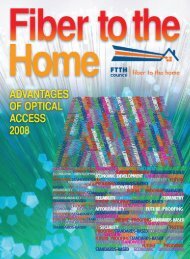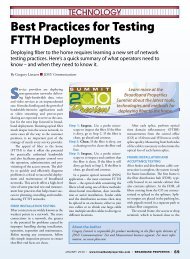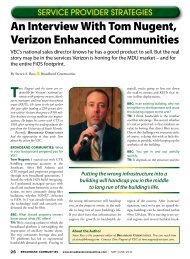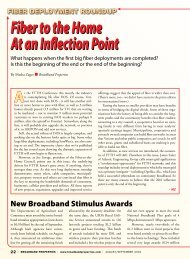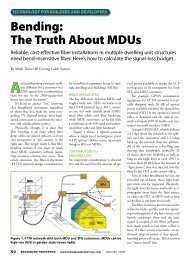TecHnoLoGy - Broadband Properties
TecHnoLoGy - Broadband Properties
TecHnoLoGy - Broadband Properties
Create successful ePaper yourself
Turn your PDF publications into a flip-book with our unique Google optimized e-Paper software.
the lawto owners and more efficient than thehome run wiring rules.The cable home wiring rules apply“upon voluntary termination of cableservice by an individual subscriber” inan MDU. When the subscriber contactsthe incumbent to terminate service, theincumbent must give the subscriber anopportunity to purchase the cable homewiring at the per-foot replacement cost.If the subscriber declines to purchase,and either the MDU owner or the alternativeprovider has notified the incumbentthat the alternative provider wishesto use the wiring, the owner or the alternativeprovider may purchase the cablehome wiring at the replacement cost.Only if no party wishes to purchase itmay the incumbent remove the cablehome wiring (47 C.F.R. §76.802).Therefore, the owner’s first step is tonotify all residents that beginning on adate certain (arranged in coordinationwith the PCO), they may choose to terminatethe MSO’s service in favor of thePCO’s service. Those wishing to exercisethat choice are advised to notify theMSO of their decision either in writing,by e-mail or via telephone.If in response to subscriber terminationnotices, the MSO fails to inform thesubscribers of their option to purchasethe cable home wiring (which, after theSheet Rock Order, includes all the insidewiring from the wall plates to thejunction box) at its per-foot replacementcost, that wiring “shall be consideredabandoned, and the incumbent may notprevent the alternative provider from usingthe home run wiring immediately toprovide service” (47 C.F.R. § 76.802(e)).On the other hand, if the MSO doesproperly inform the subscribers of theirpurchase option, and a subscriber declinesto purchase the wiring, the MDUowner or the PCO (or both together)may purchase it at the per-foot replacementcost.Either way, the PCO may gain accessto the incumbent MSO’s existing insidewiring without waiting for the variousdeadlines described in the FCC’s homerun wiring rules. Furthermore, the MSO“must take reasonable steps to … ensurethat an alternative service provider has accessto the home wiring at the demarcationpoint” (at the junction boxes). The MSO’sfailure to cooperate in transitioning to thePCO would violate this obligation, givingrise to a complaint to the FCC.If the MSO fails to informsubscribers of their option to purchasethe cable home wiring at its per-footreplacement cost, that wiring is consideredabandoned, and the incumbent can’tprevent the new provider from using it.The new provider or the MDU owner will dothe actual wiring purchase, of course.How an MSO Could Fight BackNow let’s consider how moving the demarcpoint affects the MSO’s three objections,described above, to the MDUowner’s attempt to invoke the unit-byunithome run wiring rules:1 The fact that the service agreementgives the MSO the right to control andmaintain all the inside wiring is irrelevantto the application of the homewiring rules. Those rules vest certainrights in the video subscriber, and thesubscriber is not a party to, or boundby, the service agreement between theMSO and the MDU owner.2 The fact that the service agreementspecifically addresses the dispositionof home run wiring or cable homewiring does not preempt applicationof the FCC rules for cable homewiring. Again, the cable home wiringrules were promulgated as a consumerprotection measure, and areunaffected by provisions containedin an agreement to which the subscriberis not a party.3 Unlike the rules for home run wiring,which allow the incumbent toremove the home run wiring in lieuof offering it for sale, the rules for cablehome wiring specifically requirethat the wiring be offered for sale tothe subscriber (or to the MDU owneror the alternative provider) prior tothe incumbent exercising the removaloption. This fact significantlydiminishes (relative to the home runwiring rules) the incumbent MSO’sbargaining power in negotiating dispositionof the inside wiring.Thus, none of the MSO’s three objectionsis a valid defense to applicationof the FCC’s cable home wiring rules,which, following the Sheet Rock Order,now apply to all of the “horizontal wiring”in an MDU building, assuming thewiring is located behind drywall. Theprocedure outlined above provides theMDU owner with a much more efficientmeans of gaining control over existinginside wiring for the purpose of bringingcompetition to buildings no longer subjectto exclusive access agreements. BBPAbout the AuthorCarl Kandutsch, formerly a staff attorneyin the FCC’s Cable Bureau, is currentlyGeneral Counsel of DirecPath, LLC, andmay be contacted via email at ckandutsch@verizon.net.References1Matter of Exclusive Service Contracts for Provisionof Video Services in Multiple DwellingUnits and Other Real Estate Developments,Report and Order and Further Notice of ProposedRulemaking, MB Docket No. 07-51(rel. Nov. 13, 2007) (“Exclusives Orders”).247 C.F.R. § 76.804(b)(1).3Matter of Telecommunications Services InsideWiring, Report and Order and SecondFurther Notice of Proposed Rulemaking, CSDocket No. 95-184 (rel. Oct. 17, 1997), 67.4Matter of Implementation of the Cable TelevisionConsumer Protection and ConsumerProtection Act of 1992: Cable Home Wiring,Report and Order and Declaratory Ruling,CS Docket No. 95-184 (rel. June 8, 2007).547 C.F.R. § 76.800(d).647 C.F.R. § 76.5(ll).747 C.F.R. § 76.5(mm)(2).86 | BROADBAND PROPERTIES | www.broadbandproperties.com | July 2008



